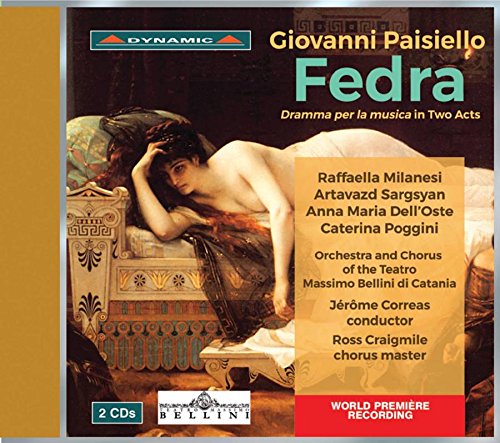PAISIELLO Fedra
View record and artist detailsRecord and Artist Details
Composer or Director: Giovanni Paisiello
Genre:
Opera
Label: Dynamic
Magazine Review Date: 01/2017
Media Format: CD or Download
Media Runtime: 118
Mastering:
DDD
Catalogue Number: CDS77501-2

Tracks:
| Composition | Artist Credit |
|---|---|
| Fedra |
Giovanni Paisiello, Composer
Artavazd Sargsyan, Teseo Catania Teatro Massimo Bellini Chorus Catania Teatro Massimo Bellini Orchestra Esther Andaloro, Diana Giovanni Paisiello, Composer Giuseppe Lo Turco, Plutone Jérôme Corréas, Conductor Leonardo Catalanotto, Harpsichord Raffaella Milanesi, Fedra Salvatore D’Agata, Mercurio Sonia Fortunato, Tisifone |
Author: Richard Lawrence
Giovanni Paisiello is known primarily as the composer of Il barbiere di Siviglia (1782), the opera blown out of the water by Rossini’s version of 1816. Less well known, perhaps, is the influence of Paisiello’s Barbiere on Mozart’s Le nozze di Figaro (1786). The two composers had much in common, and not simply because of a shared musical language: one of the arias here, Aricia’s ‘Se nell’amar’, sounds strangely like Vorrei spiegarvi, oh Dio!.
Mozart composed that aria in 1783; Fedra was first performed in Naples on New Year’s Day 1788. Paisiello and his librettist, Luigi Salvioni, cover the ground in just two acts, at some cost to the pacing of the drama: Theseus doesn’t learn of Hippolytus’s supposed assault on his stepmother, for instance, until nearly halfway through Act 2. The arias are tuneful, with much coloratura for Aricia. Some have orchestral introductions, with charming woodwind solos; in other instances, the character plunges straight in. Phaedra’s accusation and later confession are, disappointingly, set in secco recitative, despite there being several effective accompanied recitatives elsewhere. The choruses – here sounding rather woolly – include a scene for the Furies straight out of Gluck.
Jérôme Correas makes a good case for the opera, with neat playing from the orchestra. The soloists are variable: the best is Anna Maria Dell’Oste, bright and accurate in Aricia’s coloratura. Caterina Poggini matches her well in the opera’s only duet. Raffaella Milanesi is impassioned in Phaedra’s first aria, reminding one of Elettra in Idomeneo, while Artavazd Sargsyan sounds suitably angry in ‘Va t’invola’. The smaller roles are not well taken. There is some stage noise and distant applause.
Discover the world's largest classical music catalogue with Presto Music.

Gramophone Digital Club
- Digital Edition
- Digital Archive
- Reviews Database
- Full website access
From £8.75 / month
Subscribe
Gramophone Full Club
- Print Edition
- Digital Edition
- Digital Archive
- Reviews Database
- Full website access
From £11.00 / month
Subscribe
If you are a library, university or other organisation that would be interested in an institutional subscription to Gramophone please click here for further information.




